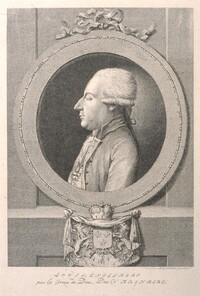The “Blind Duke”
The Revolutionary Career of Louis Engelbert of Arenberg between the Habsburg, Holy Roman, and Napoleonic Empires
At the time of his birth, Louis Engelbert of Arenberg (1750–1820) appeared set to lead a splendid, if possibly conventional life as one of Europe’s great nobles. He stood to inherit a massive landed fortune strewn across the Low Countries, the Rhineland, and France; he was the heir to an independent duchy in the Holy Roman Empire and the governorship of an Austrian-ruled province in the southern Netherlands; and as a Habsburg army officer he seemed set to follow his father and grandfather as an imperial field marshal.
Yet a tragic accident in early manhood leading to the loss of his vision dramatically altered these prospects. Arenberg was to spend two-thirds of his life completely blind. A planned biography will explore how he came to terms with this disability, most especially as he sought to preserve and even enhance the political and material existence of the house of Arenberg in the face of the revolutionary forces that swept western and central Europe from the 1780s. These would alter the basic social, political, and legal parameters of his life.
Biographies of blind princes and rulers are rare, notwithstanding the emergence in recent years of disability studies as a research area. Because of the surviving wealth of written sources, pictures, and even original contrivances specially made for him, Arenberg led an astonishingly well-documented existence. Yet due to the stigma earlier attached to blindness, he has been largely forgotten or belittled as the “blind duke”.
The biography will furthermore highlight Arenberg’s close working political relationship with his wife, Louise Pauline de Brancas-Lauraguais (1755–1812), and with the other women of his family. The issue of cooperation especially between husbands and wives in great noble families in this period of rapid change is little explored, despite shifting gender expectations.
The planned biography will also offer a unique trans-imperial perspective on Arenberg’s life. In recent decades historians have drawn attention to the fact that empires and large composite states commonly relied on local elites to govern. At the same time, this power mechanism is seldom visible at the individual level and in one life. In Arenberg’s biography this dynamic comes clearly into view across the entire revolutionary era and, uniquely, in three empires – the Habsburg Monarchy, the Holy Roman Empire, and the Napoleonic Empire.

